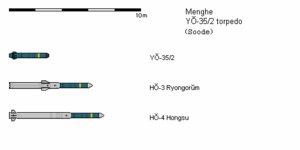YŎ-35/2 torpedo
| YŎ-35/2 | |
|---|---|
 | |
| Type | Torpedo |
| Place of origin | Menghe |
| Service history | |
| In service | 2004-present |
| Used by | Menghe Polvokia Argentstan Republic of Innominada |
| Production history | |
| Manufacturer | Buksŏng Industries Group |
| Variants | see below |
| Specifications | |
| Weight | 412 kg |
| Length | 3.04 m |
| Diameter | 350 mm |
| Warhead | PBX shaped charge warhead |
| Warhead weight | 55 kg |
| Engine | Pump-jet Electric |
Operational range | 8 km (high speed) 25 km (low speed) |
| Maximum depth | 800 m |
| Speed | 22 knots (low speed) 54 knots (high speed) |
Guidance system | Active or passive acoustic homing |
Launch platform | Surface ships aircraft HŎ-2N Poksŏl-N HŎ-3 Ryongorŭm |
The YŎ-35/2 (Formal designation: 2호 35센티미터 유도 어뢰, i-ho sam-o-sentimitŏ yudo ŏroe, "No.2 35-centimeter guided torpedo;" Short designation 유어-352, yu-ŏ sam-o-i, "YŎ-35/2") is a type of lightweight torpedo designed in Menghe in the early 2000s. It is designed for anti-submarine warfare, and has both passive and active acoustic homing guidance, allowing it to autonomously home in on a submarine or surface target after launch. It can be deployed by helicopters, fixed-wing aircraft, surface ships, and missiles.
YŎ-35/1
The immediate precursor to the YŎ-35/2 was the YŎ-35/1. This lightweight torpedo was designed in the early 1990s as part of the development process for the HŎ-2 Poksŏl anti-submarine standoff weapon. Because of its weight savings over other Menghean 40cm and 45cm torpedoes, it was also developed into air-launched and surface-launched variants, giving greater range to ship-based anti-submarine helicopters. Nevertheless, its speed, range, maximum depth, and seeker sensitivity were all disappointing, and not long after it entered service, the Menghean Navy ordered development of a newer lightweight torpedo to replace it.
Design
The YŎ-35/2 uses electric pump-jet propulsion, and has two speeds: low-speed (26 knots) and high-speed (54 knots). In low-speed mode, the torpedo has a longer range due to reduced fuel consumption, and is quieter in transit, increasing its likelihood of reaching active seeker mode undetected. There is also a third "low-high speed" mode, in which the missile approaches the target area at low speed but accelerates to high speed once its seeker locks onto a target.
The warhead consists of a 55-kilogram shaped charge. While the explosive content is low, the weapon's explosive-formed penetrator can puncture the reinforced pressure hull of a nuclear submarine, even one using a double hull design.
Menghean sources claim that the YŎ-35/2 has a seeker acquisition range in excess of 1.5 kilometers. Variants with a modified seeker, designated YŎ-35/2D and R, were unveiled in 2011. This seeker improves the torpedo's target acquisition range and is better at tracking submarines with anaechoic tiles. It can also reportedly identify submarines sitting on the ocean floor, and distinguish submarines from acoustic decoys. Both torpedo types can be launched with an initial inertial mode, either following a straight course at a shallow depth, following a straight course at the target's depth, or circling in the water until a target is found. The third mode is used on air-launched and rocket-launched torpedoes.
Variants
- YŎ-35/2G
- Original stationary-launch version, used by surface ships and midget submarines. Follows a straight course toward the target with programmable speed and depth profiles.
- YŎ-35/2N
- Original air-launch version, used by fixed-wing aircraft, helicopters, and missiles. Follows a very-low-speed spiraling trajectory until a target is acquired, then sprints toward the target. Missile-launched versions have a drogue chute only, while fixed-wing and helicopter-launched versions have a pylon-like structure that links the drogue chute attachment to the aircraft's hardpoint. These two versions do not appear to have separate designations; rather, the parachute and carrying-platform connection structures are considered separate items.
- YŎ-35/2D
- Stationary-launch version with upgraded seeker. First unveiled in 2010.
- YŎ-35/2R
- Air-launch version with upgraded seeker.